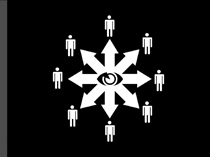THE PIRATE CINEMA

A CINEMATIC COLLAGE GENERATED BY PEER-TO-PEER NETWORK ACTIVITY
* The Pirate Cinema reveals Peer-to-Peer information flows.
* The Pirate Cinema is a composition generated by the activity on file sharing networks.
* The Pirate Cinema immerses the viewer in network flows.
-
In the context of omnipresent telecommunications surveillance, “The Pirate Cinema” makes the hidden activity and geography of Peer-to-Peer file sharing visible. The project is presented as a monitoring room, which shows Peer-to-Peer transfers happening in real time on networks using the BitTorrent protocol. The installation produces an arbitrary cut-up of the files currently being exchanged. This immediate and fragmentary rendering of digital activity, with information concerning its source and destination, thus depicts the topology of digital media consumption and uncontrolled content dissemination in a connected world.
> DETAILED PRESENTATION OF THE PROJECT
The Pirate Cinema : TPC is based on a data interception software. It reveals, through a simple diversion, different aspects of exchange platforms, such as the global and multi-situated nature of Peer-to-Peer networks (P2P), the potential for viral transmission, and alternative social models. Its purpose is to make available for aesthetic exploration the pre-existing potentials of Peer-to-Peer architectures.
* [a] VIDEO INSTALLATION VERSION *
The video installation of TPC relies on an automated system that constantly downloads the most viewed torrents. The intercepted data is immediately projected onto a screen, after which it is discarded. Depending on the exhibition space, the installation involves one to five computers, each one monitoring specific categories of files. This allows the system to visualize fragmentary files received and sent all over the world.
* [b] LIVE PERFORMANCE VERSION *
The live performance of TPC relies on an automated system that downloads a selection of torrent files (movies, mp3) selected by the performer. This system is an instrument in itself, producing specific temporal and formal structures, from parameters defined by the performer. The performance lasts the amount of time required to download a group of files. The choice of the downloaded files may be related to the local or actual context. (Place, local cultural context, political, economic, etc.)
Nb: Downloading Torrents is not a linear process. Completion of a file is done in a disorderly manner, and according to an irregular rate. Which leads, in the context of this project to a rearrangement of the full temporal continuity of initial video and sounds.
* [a] From VHS to Peer-to-Peer *
During the 80s, the availability of VHS brought the cinema into the living room. Today, Peer-to-Peer sharing and the Internet allows us to use our personal computers and mobile phones for cinematic experience. With these means of dissemination, a discussion on the media, the medium and what it specifically conveys gets opened.
* [b] fragmented flows *
The Peer-to-Peer Sharing protocol is based on small samples file fragmentation, it is an exchange unit or chunk. This fragmentation smoothes exchanges to different recipients. File can then be reconstructed sample by sample until completion, from chaotic scraps received from distinct users.
* [c] Mashup Cinema *
From a cinematic perspective, this prior cutting of the media, is also a cutting of the film material and of the narration. These "broadcasting mechanics" involves those potentials - a recombinant cinema - random collages - weaving of different films interlaced frame by frame.
* [d] Tubes logic *
The Pirate Cinema proposes a way of perceiving the film as a digital stream, or rather streams spread worldwide. In other words, The Pirate Cinema proposes to watch the films again through the logic of cables (which is unique to each connection and location).
* [e] Peer-to-Peer architecture as an alternative structure *
During the last ten years, Peer-to-Peer computing has become very popular. This horizontal network architecture paves the way for new modes of exchange and contribution. It recalls the utopian vision of openness and free appropriation that arose in the early days of the Internet. This model is more than a type of digital network architecture, as it clearly reflects ideological choices that have an impact on the way society is understood.
"Peer to peer is much more than file sharing. What it's really about is how the computers are organized, but crucially how the people are organized. So Peer-to-Peer is a relation dynamic in a distributed network - its a network whereby every individual has the freedom to act and the freedom to engage in relationship without asking permission […] it permits individuals to produce, to distribute, to share, to work together with other individuals without asking permission." (Michel Bauwens)

Nicolas Maigret exposes the internal workings of media, through an exploration of their dysfunctions, limitations or failure thresholds which he develops sensory and immersive audio visual experiences. As a curator, he initiated the disnovation.net research, a critique of the innovation propaganda. He teaches at Parsons Paris and cofounded the Art of Failure collective in 2006. His work has been presented in international exhibitions and festivals: Transmediale (Berlin) - File (Sao Paulo) - Museum of Art and Design (New York) - 30th Chaos Communication Congress (Hamburg) - NWFF (Seattle) - SAIC (Chicago) - China Museum of Digital Arts (Beijing) - The Pirate Bay 10th Anniversary (Stockholm) - Palais de Tokyo (Paris) - Eastern Bloc (Montreal) - Gli.tc/h (Birmingham)…
Conception: Nicolas Maigret - 2012-2014 | Software development: Brendan Howell & Jean-Marie Boyer
Production: ArtKillArt, La Maison populaire, Eastern Bloc | Supports: CNC / DICREAM (Ministère de la Culture et de la Communication), artist in residence at Maison Populaire - CG 93 (Seine Saint-Denis, France), Mal au Pixel Festival, La Gaîté Lyrique, Labomédia.
One of the most interesting aspects of present content consumption is the ubiquity of platforms and competing social networks. 4K Download is the developer of popular video downloader which allows users to get movies and songs from almost any source.
